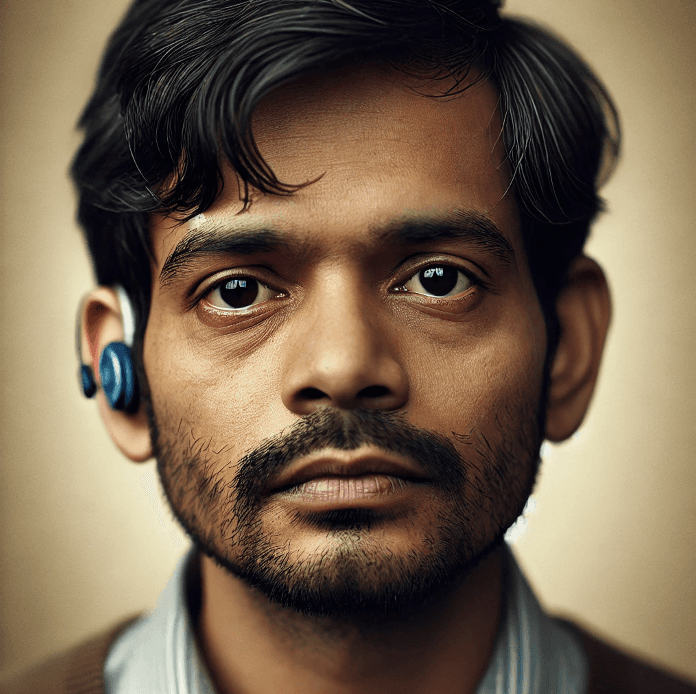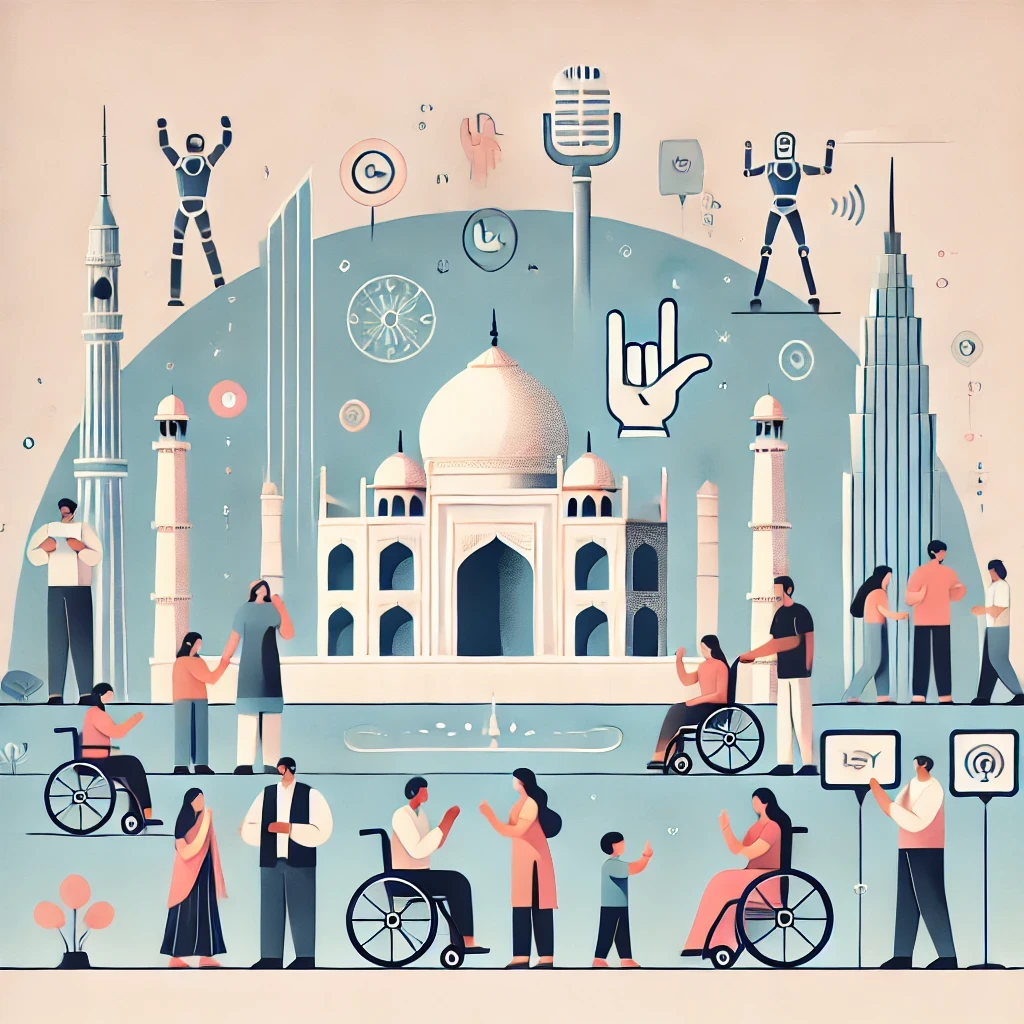Breaking the Sound Barrier: How AI is Opening New Doors for India's Deaf Community
A young professional sits in a meeting room, struggling to divide attention between the presentation slides, lip-reading the speaker, and following real-time captions on their phone. This is Jayan's daily reality –– one shared by millions of deaf Indians who rely on oral communication and lip-reading.

The hidden diversity of deafness
According to the 2011 Census, India has over 5 million people with hearing impairments, though disability rights organizations estimate the actual number could exceed 65 million. Behind these numbers lies a crucial detail often overlooked: deafness exists on a spectrum, with people having varying degrees of hearing loss and different preferred modes of communication.
Many deaf individuals, particularly those with partial hearing loss or those who use hearing aids and cochlear implants, prefer oral communication combined with lip-reading.
The overlooked challenges
For people like Jayan who choose oral communication, current solutions create as many problems as they solve:
Constant visual juggling between speakers, presentation materials, and caption screens
Cognitive fatigue from processing rapid-fire transcriptions
Difficulty getting attention when trying to respond, especially with speech clarity issues
The social isolation that comes from delayed responses when having to type out replies
"Communication isn't just about understanding words – it's about participating in the flow of conversation. When someone has to constantly switch between looking at captions, the speaker, and typing responses, they're not really part of the natural conversation rhythm," explains Gopikrishnan Sasikumar, who is spearheading Sunva along with Bharat Shetty.
The project began when Bharat Shetty highlighted the daily challenges deaf people face in India. With recent advances in speech recognition and text-to-speech technology, the timing was right to develop new solutions. Sunva emerged from this insight – a tool designed to address the real communication barriers in the deaf community.
Sunva transcribes and simplifies transcriptions for easy reading for deaf people. Those with non-standard speech can type, and Sunva will correct it before speaking via TTS.
AI opening new doors
This is where artificial intelligence enters the picture, not to replace existing solutions but to expand the range of choices available to the deaf community. Sunva is pioneering an approach that combines three key technologies:
Smart transcription that highlights important information while summarizing less crucial details
Natural language processing that helps complete partial sentences and could aid as language learning support aid
Text-to-speech capabilities that allow typed responses to be spoken aloud thereby helping a deaf person with irregular speech or lack of speech clarity to grab attention of hearing peers
Think about how this changes the dynamics: Instead of choosing between missing visual cues or caption details, users can glance at simplified transcripts that capture the essence of what's being said. Rather than typing complete sentences, they can input key words and let AI help construct natural responses.
The power of choice: Redefining accessibility standards
For too long, accessibility has been viewed through a narrow lens - one that often pushes single solutions onto diverse groups of people. When institutions mandate Indian Sign Language as the only communication method for deaf individuals, they overlook the rich diversity within the deaf community itself.
Some people prefer lip-reading combined with hearing aids. Many folks go for Cochlear implants based on their diagnosis in consultation with ENT doctors and audiologists. The spectrum of deafness is vast and learning to cope with it depends on various factors such as the range of hearing loss, available speech therapy modes, educational support as well as family background and support.
Based on this, deaf individuals embrace a myriad of options for communicating with society in general as they grow up.
Others might choose a mix of spoken language and visual cues. The beauty of AI-powered communication tools lies in their flexibility –– their ability to be personalised to individual preferences rather than forcing individuals to adapt to a single system.
This shift from prescriptive to adaptive solutions marks a crucial evolution in how we think about accessibility. True inclusion means supporting people's chosen ways of engaging with the world, not deciding those ways for them.
The human impact
The real question isn't about the technology itself –– it's about choice and agency. Why should anyone have to conform to a single mode of communication when technology can support multiple approaches?
If you’re wondering whether Sunva has a place in improving the lives of deaf people, I’d ask you to examine these key questions:
How would educational outcomes improve if deaf students could choose communication methods that match their individual needs?
What could workplace inclusion look like if deaf employees had flexible tools for different communication scenarios?
What would social inclusion outcomes look like if deaf persons get translation support for multiple languages along with English in various public establishments, events to aid their communication
How many more voices could contribute to India's growth if we removed unnecessary communication barriers?
A call for inclusive innovation
The path to better accessibility is a collaborative effort that needs diverse voices, especially from the deaf community. Sunva's approach centers on continuous feedback and improvement: building prototypes, testing with deaf volunteers, and refining capabilities based on real-world experiences.
But our vision extends beyond just technology development. We're committed to publishing research based on our findings and hypothesis testing, adding to the growing body of knowledge about AI-assisted communication.
More importantly, we're working to engage with policymakers to develop frameworks that make AI-powered communication tools more accessible across India.
This is where you come in. Whether you're part of the deaf community with insights to share, a developer passionate about accessibility, or an organization working in this space, your perspective matters. We need voices from across the spectrum of hearing abilities to help shape solutions that work for everyone.
True innovation in accessibility means:
Embracing diverse communication preferences instead of one-size-fits-all solutions
Supporting multiple modes of interaction, including Augmentative and Alternative Communication (AAC)
Making sure deaf individuals lead the conversation about tools built for their use
Building awareness about the varied needs across different hearing abilities
The future we're building is about expanding choices and opportunities. As India moves forward in digital innovation, let's make sure these advances serve everyone's needs, regardless of their preferred communication style.
Ready to be part of this evolution? Send an email to gks@peopleplus.ai to express your interest. Join us in testing, providing feedback, or spreading awareness. .

